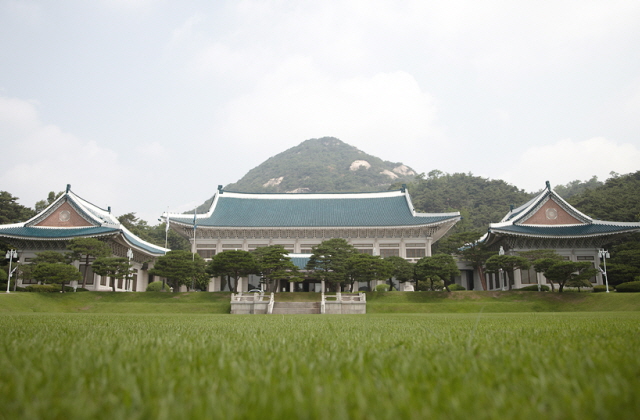이 웹사이트는 제19대 대통령 임기 종료에 따라 대통령기록관이 「대통령기록물 관리에 관한 법률」에 의해 이관받아 서비스하는 대통령기록물입니다. 자료의 열람만 가능하며 수정 · 추가 · 삭제는 불가능합니다.
다만, 「개인정보보호법」에 의하여 개인의 정보를 보호받기 원하시는 분은 관련 내용(요청자, 요청내용, 연락처, 글위치)을 대통령 웹기록물 담당자(044-211-2253)에게 요청해 주시면 신속히 검토하여 조치해 드리겠습니다. 감사합니다.
SPEECHES & REMARKS
BRIEFINGS
Chief of Staff to the President Im Jong-seok Briefs the Media on Preparations for Inter-Korean Summit

The 2018 inter-Korean summit is just 10 days away as of today, and I will brief you in my capacity as Chairman of Inter-Korean Summit Preparation Committee, not as Chief of Staff to the President. I will candidly explain to you the significance of the summit, the progress of preparations, some remaining concerns and other matters. It will be also an opportunity to communicate with you about questions you have.
The media have already reported many stories about the event, but I will briefly sum up three important points in the lead-up to the forthcoming summit.
First, the summit will be held at Panmunjeom. It has an added significance in that the North Korean leader will visit the South for the very first time. We regard the nature of this summit at Panmunjeom to be even more crucial because, if it is successful, talks at Panmunjeom might be able to take hold regardless of the possibility of regularizing inter-Korean summits back and forth between the two Koreas.
Thus, we consider the question very important of whether practical summits focusing on important issues, boldly dispensing with all protocol and functions, would be able to continue in the future. As you know, the upcoming summit is very significant because it could lead to a summit between North Korea and the United States and, as appropriate, to a summit among the South, the North and the United States.
Despite many agreements reached thus far between the South and the North, it has been difficult to continue the implementation of them because, I believe, there lacked harmony in inter-Korean talks and North Korea-U.S. dialogue as well as communication between South Korea and the United States. The 2000 inter-Korean summit and the 2007 inter-Korean summit failed to proceed with North Korea-U.S. talks, thereby making it inevitably difficult to fully implement what was agreed upon.
As a matter of fact, seeking a major change in real politics and diplomacy requires at least the patience and consent of the United States. Without them, it is almost impossible to pull off such a change. This is not my opinion but that of Egon Bahr, who served as the Secretary to German Chancellor Willy Brandt, the chief architect of German unification. In his autobiography, Egon Bahr wrote about the process of Germany pushing ahead to seek unification with its policy of reconciliation and cooperation on the basis of the patience and consent of the United States. In this regard, he wrote that he would be grateful to U.S. National Security Advisor Henry Kissinger for the rest of his life, from which an important element can be found in regard to the upcoming summit. To put it another way, we have put efforts in the amount of "one" into having dialogue with North Korea while channeling endeavors in the amount of "three" into our preparations through communication and cooperation with the United States. As a consequence, an inter-Korean summit and a North Korea-U.S. summit are now being pursued at the same time, which we hope will serve as a key to revolving fundamental problems left unaddressed.
In consideration of these two characteristics of the upcoming summit, it will become possible to remain focused on major agenda topics. This is the third characteristic of this summit.
Yet another importance we attach to the summit is that dramatic improvements in inter-Korean relations resulting from complete denuclearization and settlement of permanent peace can be a starting point in seeking improvements in U.S.-North Korea relations and in relations with other countries in the region.
Of course, we cannot seek hot water under cold ice, and Rome was not built in a day. A journey of a thousand miles begins with a single step. As such, we have so far remained cautious in dealing with matters of peace. Still, I believe that the upcoming summit will become a new beginning.
Speaking of the preparations, the Sub-Committee on Communication and Public Relations, as you know, started the D-12 open publicity operation the day before yesterday. Due to the short remaining time, there is a limit to how much we can inform the people, but we intend to make public as much detail as possible every day.
There will be a second comprehensive inter-Korean working-level meeting on protocol, security and media coverage tomorrow, and a range of issues are expected to be discussed. Related issues have been shared by both South and North Korean sides, and we need to make considerable progress on them tomorrow.
Issues regarding telecommunications are being sorted out to some extent as we have already concluded two working-level meetings. I believe a schedule for the second high-level talks, which we proposed to prepare for the inter-Korean summit, will be arranged according to the results of the working-level meeting tomorrow.
If there are many adjustments made at the working-level meeting tomorrow enough to hold the high-level talks, its schedule will likely be set right away. However, if there is a need, there is a chance that one more working-level meeting will be held.
The window of communication with the National Intelligence Service is always open, and I would like to say that communications are going very smoothly. If necessary in preparation for the summit, there is a chance of National Intelligence Service Director Suh Hoon or Director of National Security Chung Eui-yong visiting Pyeongyang.



